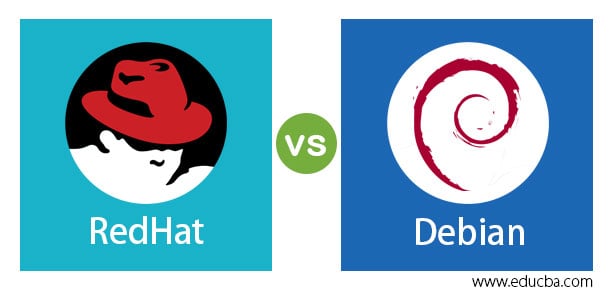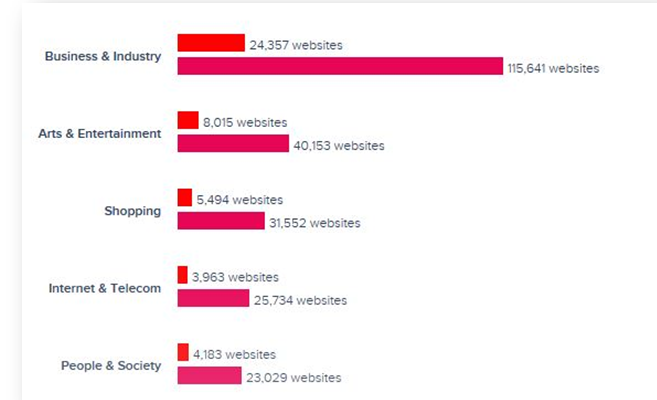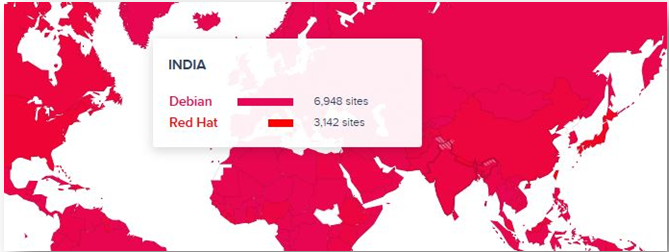Updated March 4, 2023

Difference Between RedHat and Debian
RedHat by RedHat Inc. provides open source products for any to buy and use, for which the licenses can be free up until some extend. For features beyond that, one can always pay and purchase the licenses for extra features. Debian by Debian project provides free software products for anyone to access the licensed applications without any limitations for the accessible features. While RedHat releases products like Linux as a commercial distribution, Debian releases non-commercial products. The latest stable release from RedHat was version 7.5, available from April 10, ‘18, and Debian’s recent stable release was version 9.5, available from July 14, ’18.
Head To Head Comparison Between RedHat and Debian (Infographics)
Below is the top 12 difference between RedHat vs Debian
Key Differences Between RedHat and Debian
Both are popular choices in the market; let us discuss some of the major difference.
- Market Share: The market share of both shares can be stated as a decisive and key factor for one leading the other. Below is some of the market share distribution (analytical view). Debian leads in top 10K sites, top 100k, top 1M sites and the entire web category, whereas RedHat is lagging behind in the market shares category, it loses to Debian in all the segments.
- Website Categories: As we all are well aware of the huge numbers of websites available all across the globe. These websites are more or less divided into categories based on the ground of objectives or purpose of their serve. Talking of the business industry, arts and entertainments, shopping, telecom, and several others, Debian is the leader as it has better usage coverage in these web categories, whereas RedHat is making an impact only on few web categories like Dentistry and Men’s Health.
- Geographical: Geographically, Debian is accepted to by peoples of more countries compared to RedHat. On one side, Debian makes a strong impact in countries like Germany, Russia, France, the US and 220 other countries, whereas talking of RedHat, it successfully created its market base in countries like Japan, Taiwan, Bahamas, Switzerland. From a country perspective, we can easily figure out the impact of Debian in the Indian web market.
- Packages: RedHat contains around 3000 packages roughly whereas the latest Debian release (which is Wheezy) contains more than 38000 packages listing. A general comparison on packages clearly says that Debian provides around 80%more packages than RedHat provides to its users. Comparing the Debian packages like OpenOffice, Transmission BitTorrent client and mp3 codecs etc., to RedHat, which is required to be installed manually or from the 3rd party repository.
- Bug/Issue fixing: The RedHat issue generally takes a considerable amount of time to get resolved as it is controlled and QA by a smaller community of RedHat employees, whereas bug fixing for Debian is much quicker as people from the Debian community is available in different geography and are dedicated to resolving it sooner.
- Release updates convenience: RedHat updating releases are generally six months or more time taking. A user finds the updating process really tuff, where you need to reinstall everything. On the other hand, the Debian updates are very frequent (on a daily basis) and pretty easier and takes a couple of clicks.
- Debian is more advanced and intelligent for differentiating between configuration files and other files. This result in easy installation. Here in Debian, the untouched files are updated automatically, whereas the configuration files that need user permission are modified as per the user’s decision. This feature lacks in RedHat.
RedHat vs Debian Comparison Table
Below is the topmost comparison
| The basis of comparison |
RedHat |
Debian |
| Software Licence Type | Open Source | Free |
| Stable release(Latest) | 7.5, 6.10, 5.11 / April 10, 2018 | 9.5 (Stretch) (July 14, 2018) |
| Designed and developed | Red Hat Inc. | Debian Project (Software in the public interest). |
| OS family | Linux | Unix-like |
| Initial release | February 22, 2000 | September 1993 |
| Platforms | ARM64, Power Architecture; S/390; z/Architecture, | Amd64, is64, i386, arm64, armel, armhf, mipsel, ppc64, z/Architecture, RISC-V |
| Kernel Type | Monolithic (Linux) | Monolithic(Linux, kFreeBSD, micro, GNU hurd) |
| Distribution type | RedHat is Commercial Linux Distribution | Debian is Non-commercial Linux Distribution |
| Packages Type | RedHat uses the rpm package. RedHat uses the RPM package manager. | Debian uses the deb packages. Debian uses the dpkg package manager. |
| Resolver Type | RedHat uses a yum dependency resolver. | Debian uses the apt-get dependency resolver |
| Features | Virtualization possibilities(from Linux 5 onwards)
Kernel and Performance – optimized multi-core processor, Dynamically switchable pre-queue I/O schedulers. Packaging for servers and Desktop, Security, Networking and Interoperability, Storage Management. |
X.org 7.3 integration, a Renewed emphasis on security issues, Java friendly setup, |
| Mission/Vision | RedHat is an MNC company whose intentions are profit based on every package sales. | The Debian or Debian project is founded and developed by SPI(Software in the Public interest), a non-profit organisation. |
Conclusion
Server maintenance is very costly, and this applies to any company, no matter its size. The bigger the company, the more challenges will be there. Apart from server maintaining, other factors that contribute to challenges before a best-fit solution covers your organization is application stability, enterprise edition and its features, cost of installation. The intention is RedHat is stable and secure, but genuinely speaking, the Enterprise edition of RedHat makes your company spend thousands of bucks and, to some extent, get outdated software which makes it less preferable for companies. Debian popularity worldwide and its global acceptance due to ease of operation makes it preferable to many companies.
This Debian vs RedHat article covers some of the very critical deciding factors, which in my sense, clearly go in favour of Debian. One may disagree with this Debian vs RedHat article discussion, but one cannot escape the truth. The only intention behind this Debian vs RedHat article is to throw some lights on the availabilities and things both lack in terms of business and users. Each has its pro’s and cons. All the Debian distributions available presently are just because of the supportive community and user group.
Recommended Article
This has been a guide to the top difference between RedHat vs Debian. Here we also discuss the RedHat vs Debian key differences with infographics and comparison table. You may also have a look at the following articles to learn more –





